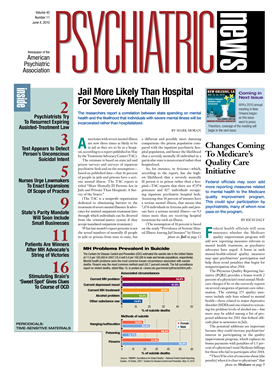Federal health officials will soon announce whether the Medicare quality improvement program will add new reporting measures relevant to mental health treatment, as psychiatry advocates have urged. A boost in such mental-health-related quality measures may spur psychiatrists' participation and help them avoid penalties that begin for nonparticipation after 2014.
The Physician Quality Reporting Initiative (PQRI) provides a bonus worth 2 percent of a physician's total annual Medicare charges if he or she correctly reports on several categories of patient-care information. The existing 175 quality measures include only four related to mental health—three related to major depressive disorder (MDD) and one related to screening for problem levels of alcohol use—but more may be added among a list of proposed additions for 2011 that federal officials plan to announce in July.
The potential additions are important because they could increase psychiatrists' interest in participating in the quality improvement program, which replaces its bonus payments with penalties of 1.5 percent of a physician's total Medicare billings for those who fail to participate after 2014.
“There'll be a lot of concerns about [the penalty] when it is clear to physicians” that such an element will be added to the program, said Robert Plovnick, M.D., M.S., director of the APA Department of Quality Improvement and Psychiatric Services, in an interview with Psychiatric News.
The penalty provision was opposed by APA during the debate on the massive health care overhaul law, because physicians have faced significant delays in obtaining responses from federal regulators on whether their PQRI reports satisfied regulatory standards in the existing voluntary PQRI program. Such delays, once the program becomes mandatory, could result in financial penalties being imposed on physicians and could result in payment cuts. But with the response delays that currently afflict the program, physicians might not know for up to a year that there are problems with their quality-of-care reports.
The addition of more quality measures addressing mental health care also is important because the current total of four such measures doesn't leave psychiatrists much leeway before they risk falling short of the program's minimum reporting requirements. The PQRI standards require physicians to report on at least three measures applicable to their practice to receive the bonus and, after 2014, to avoid the penalty. The PQRI also requires that physicians report those measures in at least 80 percent of patient encounters in which the measures apply.
Among the possible quality measure additions expected in July are those related to bipolar disorder and more related to major depressive disorder. Quality reporting measures related to dementia screening are expected in future years.
The possible future quality measures stem, in part, from those developed by the National Quality Forum (NQF), in which APA is a voting member through the American Psychiatric Institute for Research and Education. The NQF has previously endorsed a set of ambulatory-care measures for the PQRI, including those related to MDD, bipolar disorder, and substance use disorders.
Other changes that regulators in charge of the PQRI said they are considering for next year include lowering the required minimum reporting rate for applicable measures from 80 percent to as low as 50 percent of such cases a physician sees.
“For individual measures, the requirement is still 80 percent of applicable cases, but that is an example of something that would or could be reexamined and could potentially be modified,” said Michael Rapp, M.D., director of the Quality Measurement and Health Assessment Group at the Centers for Medicare and Medicaid Services, during a February 2 PQRI public hearing.
Any loosening of reporting requirements would, however, have to overcome concerns that such changes would allow unscrupulous physicians to “game” the system by reporting only on their healthiest patients, Rapp added.
